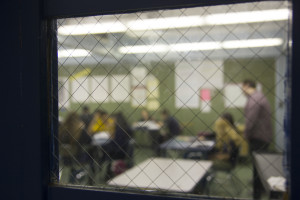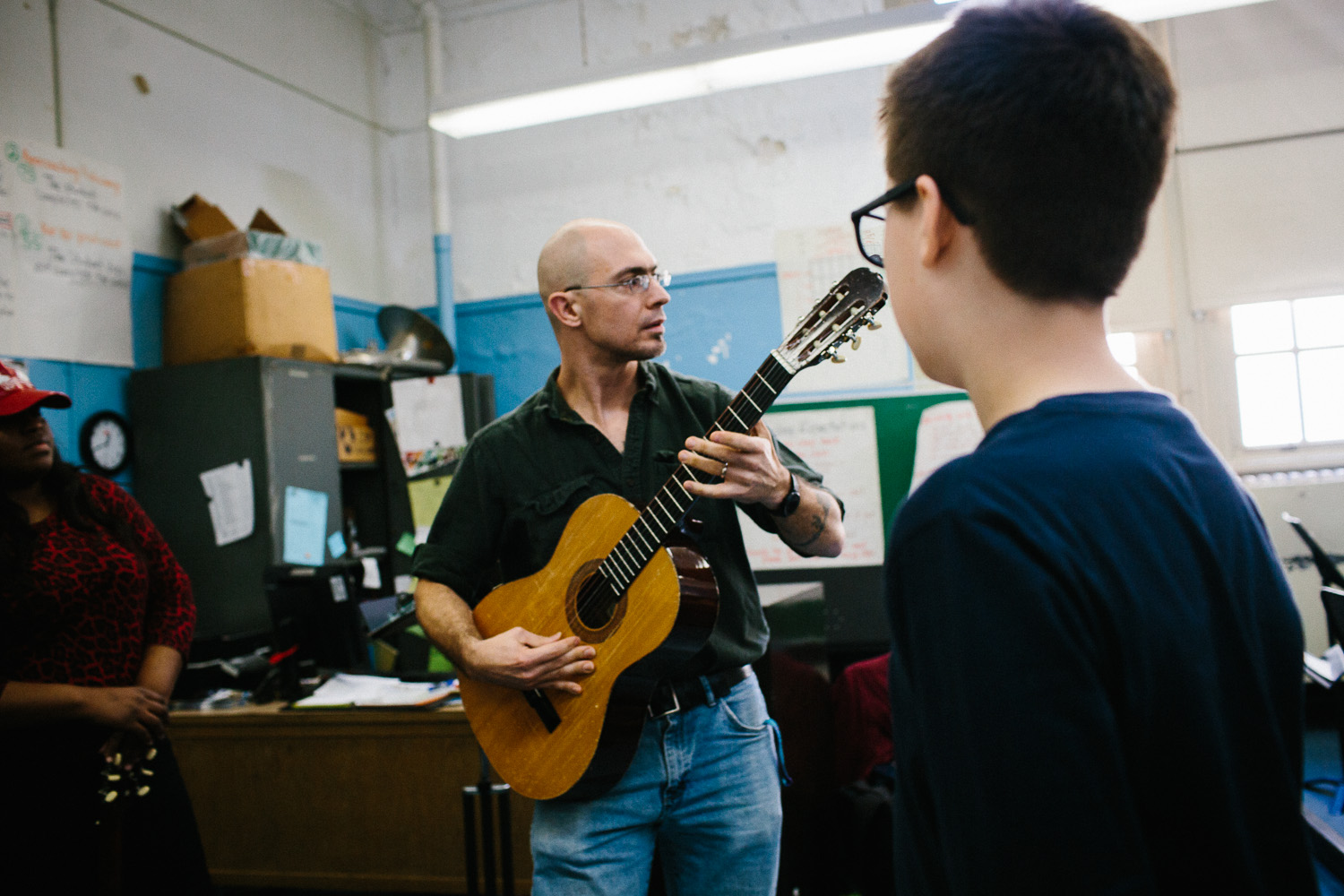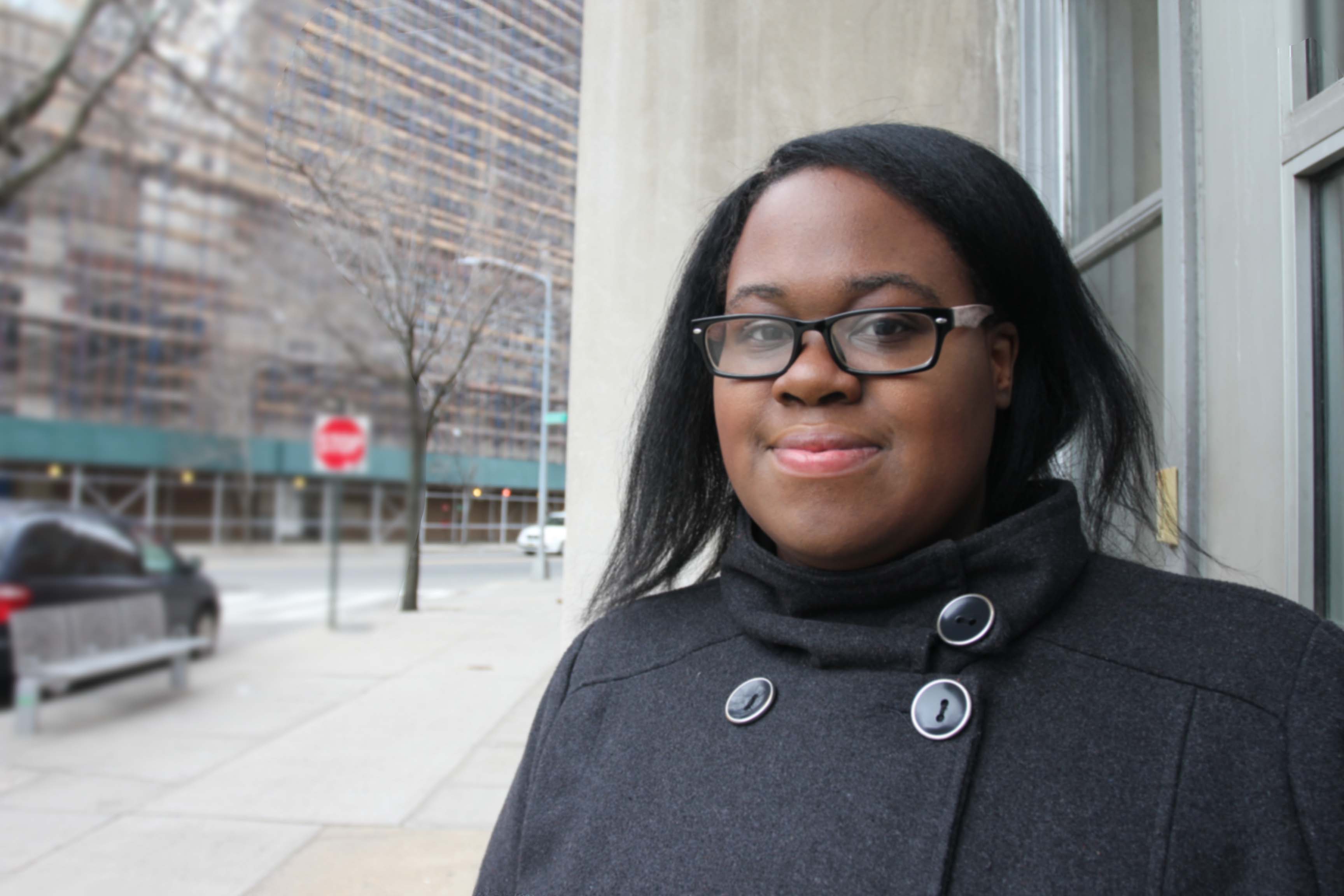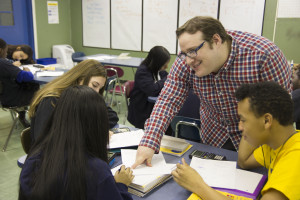
“What’s the equation of a line?” Dan Pettrota, 30, asked his math class at World Journalism Preparatory School in Queens. “Your Momma’s Ex-Boyfriend!” was the collective response. “Right,” laughed Pettrota as he walked around the room scanning for confused faces. His tenth graders had finally recalled one of the few equations they must memorize to pass the Math Regents Exam: Y= MX + B.
“Teaching is absolutely, 100 percent about performing and making the material accessible,” said Pettrota who is known at World Journalism Prep for his beaming smile that is both disarming and contagious. “If you don’t teach with personality, it’s really easy for kids to withdraw and see school as something completely separate from the real world.” And for Pettrota, who teaches students with learning disabilities, performing while he teaches is an extension of what he calls his past life—as a performer on Broadway.
Pettrota’s path into teaching was in many ways a story of loss with a happy ending. One dream morphed into another. He grew up in Gates, NY a suburb of Rochester, where he attended public school along with his siblings. After high school, Pettrota studied theatre at Ithaca College and then moved to New York City in 2005 to pursue his dream of acting on Broadway. He spent three months in the cast of “A Tale of Two Cities” playing characters most of which he admits did not even have a name, and touring throughout the country. He was living his dream. “I was making really good money doing exactly what I loved,” he recalled.
However, in 2008 at the height of the most recent recession, Pettrota was forced out of acting. As the stock market crashed, the curtain came down on “A Tale of Two Cities” and many other Broadway shows. He faced a difficult decision—take on the life of a struggling actor in a struggling industry, or pursue Plan B: teaching.
Pettrota first looked to Teach for America as a segue into education. The program promised a free master’s degree in teaching eventually. He was devastated when he was rejected. His next plan was to enter the 2009 cohort of the New York City Teaching Fellows, a program launched in 2000 to address the teacher shortage in New York City public schools by training recent college graduates and professionals to teach during an intensive summer program and subsidizing a master’s degree in teaching. Because of the economic slump, a record 17,000 applicants were vying at the same time for one of only 400 spots. This time he made the cut.

Thus began a series of new rude awakenings for the Rochester native, who grew up in a middle-class, suburban community where his exposure to diversity came mostly from having Latinos in his own family, by way of his sister’s marriage.
The New York City Teaching Fellows, like other alternative teacher certification programs, trains its teachers in an intensive, six-week, summer boot camp. The long days are filled with student teaching in the mornings, graduate-level education courses in the afternoons, and best practices seminars and lesson planning late into the night. According to Pettrota, there is little time to sleep or truly digest much of what goes on in those six weeks. Despite the rigor, many Fellows, including Pettrota, question whether it is enough to prepare teachers for the classroom.
“Only about 17 percent of teaching fellows feel adequately prepared to teach after their training,” he said, citing figures in a recent email from a survey of New York City Teaching Fellows, reported by the United Federation of Teachers.
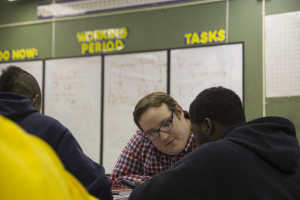
Pettrota began his student teaching at Long Island City High School as part of his summer training with the New York Teaching Fellows in 2009. He taught High School English in a jammed classroom stuffed with 40 over-age students who failed the Regents English Exam three times and were facing their last chance at earning a diploma. “It was a very challenging student population. Teaching there was really a life altering experience,” he recalled. Here he learned his first lesson in teaching—have a sense of humor. On his first day, students were shocked to have a white teacher in the classroom. “My kids that summer were predominantly African American and Hispanic,” he said. As he was introducing himself a student asked, “So what do white people eat? Do you eat like eat steak and potatoes everyday?” Pettrota laughed and simply replied, “I’m pretty sure we eat the same things you guys do. I love Viva Taqueria right next to us.”
That same first day, Pettrota learned his second lesson in teaching: Don’t take it personally when students lash out. One student in his class called him a vulgar name. “It was so shocking I can’t even repeat it,” he recalled as he looked down shaking his head. “We all have the story from our first days in teaching when we totally lost control,” he recalled. This was definitely one of those experiences for Pettrota, who felt discouraged and hurt by the comment.
After discussing the issue with his mentor teacher, Pettrota realized that sometimes students face home lives that are so horrific that the only moments of power they have are in the classroom. So for them to lash out at a teacher is sometimes really just a reflection of their personal circumstances. For instance, Pettrota was unprepared for the shocking accounts of domestic violence and abuse that some students included in their silent writing journals. One student wrote about his father pulling a gun on his mom. It didn’t occur to him that he should report it. “At the time I really had no idea what to do with this horrible information,” he admitted. This failure to prepare teachers for the underlying social and economic issues that impact student populations in urban schools is a major criticism of programs like the New York City Teaching Fellows, and one which Pettrota echoes. However, when it comes to educational outcomes, multiple studies, including one by Tom Kane of the Harvard School of Education, indicate that teachers entering the classroom through the New York City Teaching fellows are as effective as those who enter through the traditional certification route.
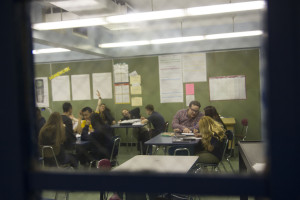
After Pettrota finished his summer training, he applied for a permanent teaching position at 170 schools. “I am very proactive,” he joked. New York City Teaching Fellows are responsible for obtaining their own permanent school placements. After what he says were “too many interviews” he decided World Journalism Prep was his best fit. “It was such a different student population from LIC,” he recalled. For the past four years, Pettrota has been teaching math and Resource Center, a tutoring lab.
In working with students in the special education department, Pettrota has developed strong opinions about what is and isn’t working in education. Jason R., 15, a sophomore in Pettrota’s Resource Center, said he likes the fact that Pettrota is involved with his students and is not afraid to speak his mind. “He knows when things are not right and he’ll call you out. He’s someone you can talk to,” he said.
Some teachers worry that Pettrota doesn’t draw a strong enough line between his role as a professional teacher and the students’ personal lives. But Cynthia Schneider, principal at World Journalism Prep, isn’t worried. She is Pettrota’s biggest fan. “He’s wonderful,” she says proudly. “He came to us from the Teaching Fellows and has become so much more than just a teacher here. He is truly invested in our kids. And he is also our technical guru!” Pettrota laughs at this label. “I’m really not at all technically inclined. I just like to figure things out,” he said. Pettrota has struggled to figure out how to become a more effective math teacher. “I really need to get better at sequencing. The order in which you teach things really matters and I have yet to find the sequence that works best,” he admitted.
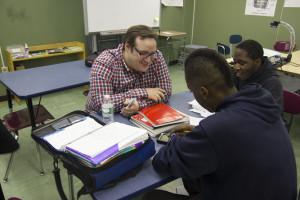
Pettrota believes that making connections with his students is necessary in order to reach them. This is how he figures out how each of his students learns. He uses humor and pop culture to build these relationships, engaging his kids in casual conversations that probe into their interests. This personal knowledge drives his lessons. For instance, he said if he is teaching English to a student whom he knows is into comics, “I’m going to talk about the X-Men and say it’s an allegory for racism or homophobia, or what not. It’s all about making the connections they can understand.”
Pettrota, is particularly concerned that his struggling and underperforming students have very few options for vocational training. For many of his students with learning disabilities, a college education is not a realistic goal. “Many of my students struggle with standardized testing and this is often the only path to college. How can we insist that college is the only route to success for them?” he asked. It’s not lowered expectations, but realistic ones. “It’s not only a fiction but also sets many of them up for failure,” he said.
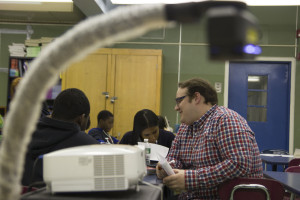
Pettrota would like to see New York City Schools adopt a vocational training model similar to the one used in Connecticut, where students can earn a vocational certificate while earning a high school diploma. Students train for technical positions in high demand, such as audio and video technology, computer technology, construction, health technology, manufacturing, tourism and hospitality management, and transportation.
Even so, for the students who are college bound, Pettrota is committed to their success. He says writing college recommendations is never a fun experience for him. He wrestles to make the letter as personal as possible. “I try to think of favorite moments with the student, extreme moments of pride that might seem menial or insignificant but that truly show their character,” he said. Pettrota recently received a letter from the QuestBridge Scholarship Committee. His latest nominee, Nidia, a high achieving, low-income senior, who has overcome multiple personal struggles, including a battle with cancer, was awarded a full-ride scholarship to the college of her choice. As he opened the envelope and read the letter, he smiled knowingly, surely because it’s victories like this one that make walking away from the Broadway lights worthwhile. “It’s incredibly powerful to see these kids, who are so smart and who work so hard, go to college for free,” he said. The recommendation letter for his next nominee sits on his desk ready to go.
